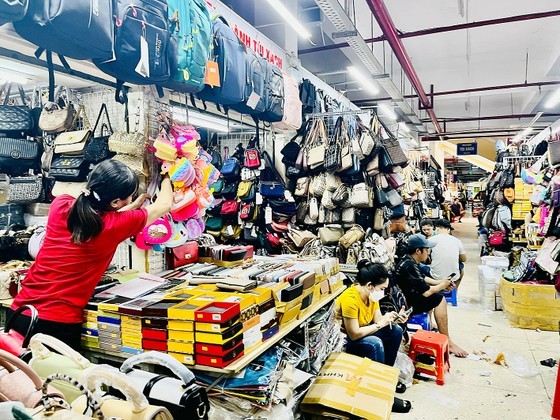
Some shop owners in major wholesale markets in Ho Chi Minh City like Binh Tay Market in District 6 or An Dong Market in District 5 confidently stated that they can always supply any quantity of fashion goods (handbags, clothes, eyewear) faking any renowned brand names in the world. They also affirm that these items are cheap enough to sell online, and that no one will be able to check them. Many retailers from the Mekong Delta are their loyal customers whose orders are for large quantities.
T., a senior wholesaler, shared that there is no need to worry about fake goods being handled by functional agencies since the supply chain has been running smoothly and secretly for many years. She then commented that newcomers in this counterfeit goods trading may find it challenging, but experienced ones have no fear at all. They merely need to choose the wished models and receive those products at door, along with corresponding warranty slips and barcodes from any brand names as requested.
However, T also admitted that she was once fined for trading goods with signs of counterfeiting and unknown origin. Therefore, she advised that newcomers should go along with senior ones to gain more experience.
A small, faked handbag at a wholesaling price of tens of thousands VND from Guangzhou can be sold at a retailed price from hundreds of thousands to a few million VND (over 10 times higher), depending on their quality. All expenses of a 10-day business trip by road (documents, accommodation, meals, transport) to buy counterfeit goods should be around VND15-20 million (US$604-806) per person.
Also, if customers want to buy and ship wholesale goods from Guangzhou to HCMC, they can use transport services like T.D (with two branches in Hanoi and HCMC) for a fee of VND37,000 ($1.5) a kilo (for packages from 200-500 kilos), VND42,000 ($1.7) a kilo (for packages from 10-100 kilos). They have smoothly and safely worked with T. for more than 10 years.
Many shops publicly selling counterfeit merchandise are located at catchy positions on streets, so it is impossible to say they are hard to detect, not to mention the professionalism of the police force nowadays. Sadly, until now, these shops have not been forced to close.
The Management Board of Ben Thanh Market (District 1), Binh Tay Market, and An Dong Market all admitted that there are cases of trading fake goods in their market. However, as they have no power to punish these salespeople, all they can do is to deliver frequent warnings and force those shop owners to temporarily stop trading for 3-7 days. For the district People’s Committee to withdraw the business permits of those shops, there must be inspection reports from functional agencies (the market management force or economic police).
Nguyen Viet Hong, General Director of Vina CHG cum Vice Chairman of the HCMC Association for the Protection of Consumer Rights, commented that the prominent reason for uncontrollable fake goods trading at present is too weak administrative punishments compared to the huge profit of those activities.
He added that a more severe sanction would be more effective to eliminate such a situation in Vietnam, while legal basis should be tightened to bring them under criminal prosecution as a deterrent. Meanwhile, the Law on Consumer Right Protection stipulates that subjects can file a lawsuit to claim compensation for damages, as long as they can prove the value of those damages. This means consumers should check the origin of merchandise carefully and ask for proof of purchase to protect themselves when the goods show sigh of defects. More importantly, consumers are responsible for their decision to buy fake goods.
Businesses themselves are not actively trying to protect their rights by registering for intellectual property rights to their trademarks, product models domestically or internationally. In addition, specialized state agencies like the market management unit, border-gate customs, and economic police must cooperate with one another to increase the capacity to fight against counterfeit goods.
Agreeing with Mr. Hong, Ngo Huynh Phuong Thao from the HCMC Bar Association said that Decree No.98/2020/ND-CP by the Government stipulates that fake goods production or packaging earns a punishment of VND2-50 million ($81-2,014) per case. Selling counterfeit merchandise is fined with VND1-50 million ($40-2,014) per individual or two times as much per organization. These amounts are too small compared to the real profits from fake good trading. Even business permit withdrawal does not scare law-breakers since it is too simple to register for a new one.
Article 192 of the Penal Code stipulates that fake goods production or trading is punished with 1-5 years in jail when those goods are priced from VND30 million ($1,200) or violators has been administrative punished before. Sadly, after receiving administrative sanctions, these law offenders immediately change the ownership of their business to another person to avoid criminal prosecution.
It is high time the National Assembly increase the administrative fines related to counterfeit goods, along with clearly defining the responsibility of a state management agency when counterfeit goods trading happens in the area under their power.
Determinedly striving to clean the trading environment, on November 1, Vice Chairwoman of HCMC People’s Committee Phan Thi Thang signed Plan No.4036/KH-UBND to strengthen the combat against smuggling, trade frauds, and counterfeit goods in the city. The plan aims at actively detecting and timely, strictly handling smuggling activities, trade fraud cases, illegal goods transportation across borders, and cases of selling, shipping, storing banned goods, smuggling items, fake products that violate intellectual property rights.
The plan is expected to create more favorable conditions for healthy import-export activities and sustainable socio-economic growth via protecting the legal rights of businesses and consumers. HCMC assigns 11 state departments and agencies to collaborate with the HCMC Market Management Department, the HCMC Customs, the city Border Guard Command, the HCMC Tax Office to finish the plan by September 2025.
























